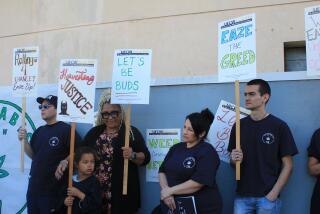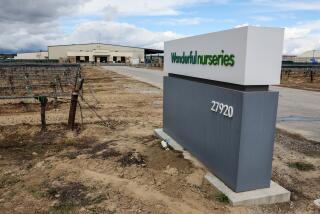Labor board confirms ouster of UFW from California’s biggest peach grower
Workers for the state’s largest peach grower have ousted the United Farm Workers union as their representative, the state Agricultural Labor Relations Board confirmed Thursday.
The decision by the board to certify the tally at Fresno County’s Gerawan Farming is a devastating blow to the union founded by Cesar Chavez — a loss of about 3,000 potential members at a time when the UFW has only 8,672 of California’s nearly half-million farmworkers under collective bargaining contracts.
It also was a sharp, though qualified, reversal by the three-member labor board, which had previously sided with the UFW in ruling that owner Dan Gerawan unduly influenced the campaign to decertify the union.
“I am speechless and beyond excited and happy because justice was finally done,” said Gerawan worker Silvia Lopez, who started up the effort to oust the UFW.
“We are thankful that the ALRB finally did the right thing after five years of suppressing workers’ rights,” said Jesse Rojas, spokesman for Pick Justice, the workers group that fought to have the vote validated.
“I just hope this ends it,” Gerawan said. “I hope this never happens again to any other farmworker or any other farmer.”
Armando Elenes, a spokesman for the UFW, said the board “abandoned” its previous findings and those of an administrative law judge. “This ALRB decision tells employers they can get away with repeated and serious lawbreaking,” Elenes said.
The ALRB ruled two years ago that the election was tainted by Gerawan’s unlawful assistance, including granting several raises and allowing workers to campaign during paid hours. The board invalidated the election and impounded the ballots, originally cast in November 2013.
That set off a five-year legal battle that ended in May when a state appeals court judge ordered the ballots counted and told the board to reconsider its conclusions about the election.
“We find that Gerawan’s unlawful conduct did not interfere with the employees’ free choice to such an extent that it affected the outcome of the election,” the labor board wrote.
Although the board stuck to its position that Gerawan’s actions were unfair labor practices, it said those activities could not have affected the outcome — 1,098 against the union and 197 in favor, with 660 ballots in dispute and 18 nullified, the board said. (The disputed ballots were “insufficient in number to have affected the outcome,” the board ruled.)
The UFW first organized Gerawan workers in the early 1990s and was certified as their collective bargaining representative in 1992. The UFW offered a contract proposal in 1994, which Gerawan rejected.
Little to no union activity occurred until the UFW reasserted its authority in collective bargaining in 2011, eight months after enactment of a law that made it easier to break labor impasses by requesting that a state-appointed mediator impose a contract.
Gerawan, who accused the union of running out the clock to trigger mediation, fought the UFW and labor board on multiple fronts. He hopes to get the U.S. Supreme Court to rule on whether imposing a contract on employers violated his constitutional rights — a prospect that now may have diminished, since the ouster of the UFW means there is no contract in force.
Follow me: @LATgeoffmohan
UPDATES:
Sept. 28, 12:00 p.m.: This article was updated with comments from a UFW spokesman.
This article was originally published Sept. 27 at 5:50 p.m.







